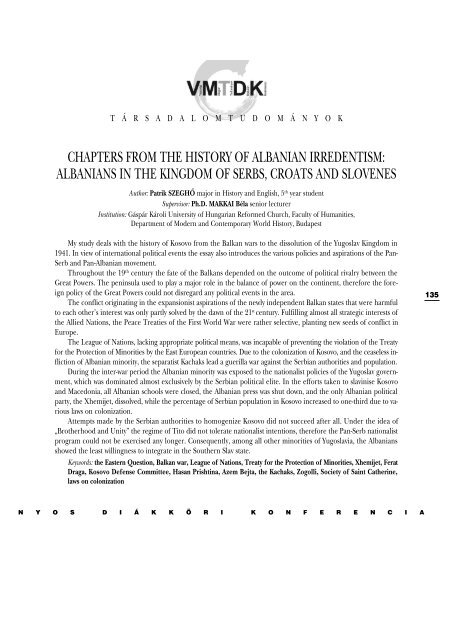Rezümékötet 2008. - vmtdk
Rezümékötet 2008. - vmtdk
Rezümékötet 2008. - vmtdk
You also want an ePaper? Increase the reach of your titles
YUMPU automatically turns print PDFs into web optimized ePapers that Google loves.
T Á R S A D A L O M T U D O M Á N Y O K<br />
CHAPTERS FROM THE HISTORY OF ALBANIAN IRREDENTISM:<br />
ALBANIANS IN THE KINGDOM OF SERBS, CROATS AND SLOVENES<br />
Author: Patrik SZEGHÕ major in History and English, 5 th year student<br />
Supervisor: Ph.D. MAKKAI Béla senior lecturer<br />
Institution: Gáspár Károli University of Hungarian Reformed Church, Faculty of Humanities,<br />
Department of Modern and Contemporary World History, Budapest<br />
My study deals with the history of Kosovo from the Balkan wars to the dissolution of the Yugoslav Kingdom in<br />
1941. In view of international political events the essay also introduces the various policies and aspirations of the Pan-<br />
Serb and Pan-Albanian movement.<br />
Throughout the 19 th century the fate of the Balkans depended on the outcome of political rivalry between the<br />
Great Powers. The peninsula used to play a major role in the balance of power on the continent, therefore the foreign<br />
policy of the Great Powers could not disregard any political events in the area.<br />
The conflict originating in the expansionist aspirations of the newly independent Balkan states that were harmful<br />
to each other’s interest was only partly solved by the dawn of the 21 st century. Fulfilling almost all strategic interests of<br />
the Allied Nations, the Peace Treaties of the First World War were rather selective, planting new seeds of conflict in<br />
Europe.<br />
The League of Nations, lacking appropriate political means, was incapable of preventing the violation of the Treaty<br />
for the Protection of Minorities by the East European countries. Due to the colonization of Kosovo, and the ceaseless infliction<br />
of Albanian minority, the separatist Kachaks lead a guerilla war against the Serbian authorities and population.<br />
During the inter-war period the Albanian minority was exposed to the nationalist policies of the Yugoslav government,<br />
which was dominated almost exclusively by the Serbian political elite. In the efforts taken to slavinise Kosovo<br />
and Macedonia, all Albanian schools were closed, the Albanian press was shut down, and the only Albanian political<br />
party, the Xhemijet, dissolved, while the percentage of Serbian population in Kosovo increased to one-third due to various<br />
laws on colonization.<br />
Attempts made by the Serbian authorities to homogenize Kosovo did not succeed after all. Under the idea of<br />
„Brotherhood and Unity” the regime of Tito did not tolerate nationalist intentions, therefore the Pan-Serb nationalist<br />
program could not be exercised any longer. Consequently, among all other minorities of Yugoslavia, the Albanians<br />
showed the least willingness to integrate in the Southern Slav state.<br />
Keywords: the Eastern Question, Balkan war, League of Nations, Treaty for the Protection of Minorities, Xhemijet, Ferat<br />
Draga, Kosovo Defense Committee, Hasan Prishtina, Azem Bejta, the Kachaks, Zogolli, Society of Saint Catherine,<br />
laws on colonization<br />
N Y O S D I Á K K Ö R I K O N F E R E N C I A<br />
135




